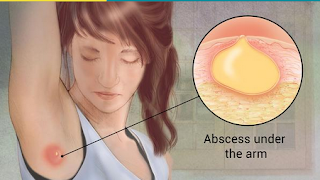Skin Abscess: Causes, Symptoms and Prevention
Description
A skin abscess is a pocket of pus. It is similar to a pimple, but larger and deeper under the skin. It forms when the body tries to protect itself from an infection by creating a wall around it. The pus contains bacteria, white blood cells, and dead skin.Causes
Common causes of a skin abscess are:- Staphylococcus is the most common bacterial cause of skin abscesses. A skin abscess can be the result of a bacterial infection that occurs when Staphylococcus aureus bacteria enters the body through a hair follicle or through a wound or injury that has punctured or broken the skin.
- A minor wound or injury
- Boils
- Folliculitis (infection in a hair follicle)
Pathophysiology
- When bacteria enter your body, your immune system sends infection-fighting white blood cells to the affected area.
- As the white blood cells attack the bacteria, some nearby tissue dies, creating a hole which then fills with pus to form an abscess. The pus contains a mixture of dead tissue, white blood cells, and bacteria.
Risk factors
- Close contact with an infected individual (which is why staph infections are more common in hospitals)
- A chronic skin disease, like acne or eczema
- Diabetes
- A weakened immune system, which can be caused by infections such as HIV
- Poor hygiene habits
Clinical manifestations
Symptoms may include:- Fever or chills, in some cases
- Local swelling around the infected spot
- Hardened skin tissue
- Skin lesion that may be an open or closed sore or a raised area
- Redness, tenderness, and warmth in the area
- Fluid or pus drainage
Complications
The most common complications that arise from skin abscesses are;- Pain, and redness of the skin (erythema)
- Swelling and warmth around the area of the abscess and swollen lymph nodes
- The tissue on and around the skin abscess may harden
- The pus-filled wound may also spontaneously drain or ooze fluid
- The infection that began at the site of the skin abscess may spread to nearby tissue and throughout the body, leading to serious complications
- Some people may experience a recurrence of skin abscesses after they have healed
- The abscesses may penetrate the body, causing a life-threatening infection that spreads through the bloodstream and affects internal organs.
Diagnosis and Test
A health care provider can diagnose the problem by looking at the affected area. The drainage from the sore may be sent to the lab for a culture to identify MRSA. This can help identify the cause of the infection.Treatment and Medications
- The only certain way to treat an abscess is to open the pocket and drain the pus. This is known as an "incision and drainage." It is a simple procedure that can be done with local anesthesia. A surgical knife is used to cut a hole in the wall of the abscess and empty it of pus.
- Cutting or puncturing the skin to drain an infection such as an abscess or boil.
- Removal of unhealthy tissue.
- Removal of dead, damaged, or infected tissue from wounds to promote healing.
- Clindamycin
- Sulfamethoxazole/trimethoprim
Home remedies
- Apply warm and dry compresses, a heating pad set on low, or a hot water bottle 3 or 4 times a day for pain. Keep a cloth between the heat source and your skin.
- If your doctor prescribed antibiotics, take them as directed. Do not stop taking them just because you feel better. You need to take the full course of antibiotics.
- Keep your bandage clean and dry. Change the bandage whenever it gets wet or dirty, or at least one time a day.
- If the abscess was packed with gauze, remove the gauze, gently pull out all of the gauzes when your doctor prescribed you.
Natural remedies
Onion
Take some thick slices of onion, place it on the boil, and gently cover it with a cloth. Ensure that the onions are replaced once in three hours. This will help the head of the abscess to surface and burst giving relief.Turmeric
Turmeric helps in decreasing inflammation and combating infection. It can be brewed into a tea by adding one or two teaspoons of this spice to water or milk. This mix should be had thrice every day for about three days.Hot water soak
Applying heat is a great way to get the infection to the top of the skin. The water helps to soften the skin and the head of the abscess will automatically ooze out by itself. To prepare a soak to add some Epsom salt if available to a tub filled with hot water and soak in it. If you don't find Epsom salt you can just use the hot water.Raw potato for skin abscess
Take a potato, slice it to about an inch, and place it on the boil. Tape it securely, so that it does not fall off. The potato helps in drawing the toxic substances from the abscess.Betel leaves
Take one betel leaf and allow it to boil in water until the leaf becomes nice and soft. Once it becomes soft add castor oil on this leaf and place it on the abscess. Leave this on the boil for one or two hours and replace later.Prevention and Cure
To avoid getting an abscess, maintain good personal hygiene by washing the skin with soap and water regularly. Avoid cutting oneself when shaving the underarms or pubic area.You can reduce the risk of bacteria spreading by:
Washing your hands regularly
Using separate towels and not sharing baths
Don't share razors or toothbrushes
Waiting until your skin abscess is fully treated and healed before using any communal equipment, such as gym equipment, saunas or swimming pools
Take care when shaving your face, legs, underarm areas or bikini area to avoid nicking your skin. Clean any wounds immediately and visit your GP




.webp)







No comments: